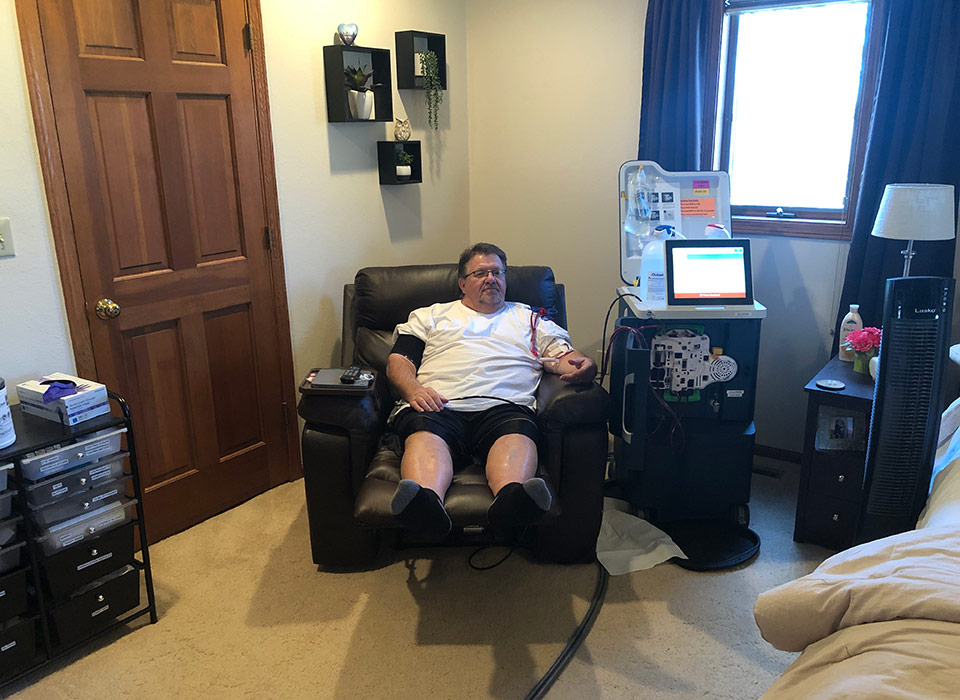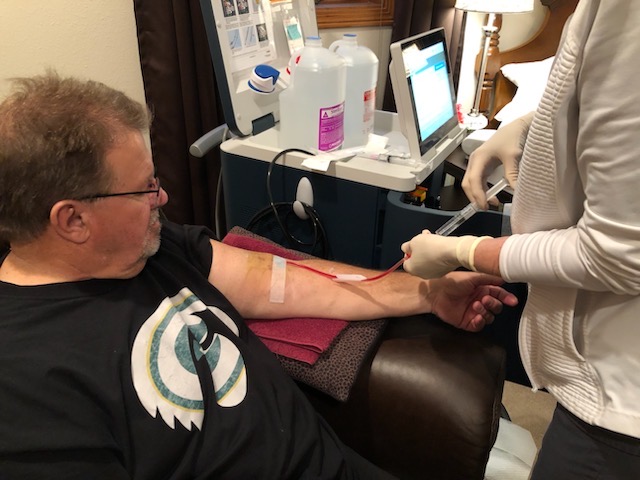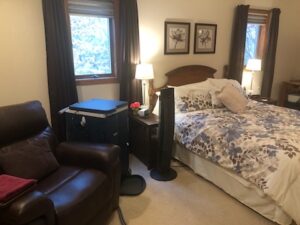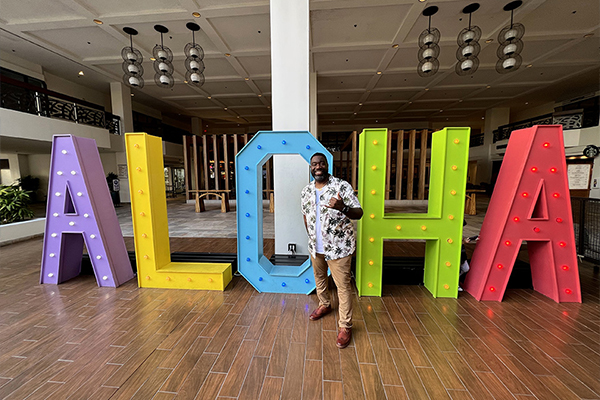Living His Best Retired Life on Home Hemodialysis

Summary
Tim, the first end-stage renal disease patient to go on home hemodialysis in his rural area with the Tablo® Hemodialysis System, says his quality of life is dramatically improved and he’s able to enjoy time with his large family, after switching from in-center treatment.
Tim, who lives with his wife in rural southeastern Iowa near the Missouri border, wanted to continue to live as normal a life as possible after finding out he had end-stage renal disease (ESRD) and needed to go on dialysis a few years ago. A pioneering nephrologist starting a home hemodialysis program featuring the Tablo® Hemodialysis System in his area helped Tim to do exactly that, within a month of his work retirement. Dialysis on his own terms at home, instead of in-center, has changed everything for Tim and his family.
“Home dialysis on Tablo allows you to live, and be a normal human being, instead of being consumed with spending several days of your week in-center,” says Tim. “Getting out of that environment and being home where I can live, I can breathe, was a real positive and motivating thing.”
“In-center also wasn’t working with my full-time job,” he continues. “It took everything out of me. I would literally come home from treatment, maybe have a bite to eat, and go to bed. Being 65, I decided it was time to retire.” Tim retired last October, after spending more than 45 years in the healthcare field, including more than 10 years in hospital administration.

Around this same time, Tim’s nephrologist, Maria Story, MD at Southeastern Renal Dialysis, and her team were starting up a new Tablo home hemodialysis program, the first of its kind in their rural area (read about this innovative patient-centered program here). After talking to Dr. Story about the ease of use and flexibility of Tablo, Tim became the first of her patients to be trained on Tablo. He has now been successfully and easily managing his own treatments at home for more than a year, with his wife as his care partner. Here he offers his story and advice for others who may be considering home dialysis.
Weight Gain and Kidney Failure
Tim discovered that his renal function was declining during a routine physical with his primary care doctor about six years ago. He had been gaining weight, and although he tried different diets and cutting back on food, his weight continued to rise. He also has had Type 2 diabetes, a risk factor for renal disease, for about 10 years.
For a three-year period, he tried combatting the excess weight with medications and diuretics, but they didn’t help. After being referred to a nephrologist, he found out his kidneys were failing and he would soon need to have dialysis. “My first thought was, no, that’s not going to happen,” says Tim. “But then I realized that I had to do it.”
In September 2021, he began in-center dialysis at a facility near where he worked, after having a chest catheter placed. He then had an arteriovenous (AV) fistula placed in his left arm, that took about three months to mature before it could be used. He was glad to begin losing the weight caused by excess fluid retention from his kidney failure.
“I went in for treatments on Monday, Wednesday and Friday, and on those days I would work half a day and take a half a vacation day to go in-center,” says Tim. “I would get there at noon and leave about 4:30. It was a constant battle and very stressful. And if I can be honest, despite the wonderful staff and patients, going to the center was depressing. It got to the point where every week I potentially would see someone that wouldn’t come back because they didn’t win the fight.”
A Life-Altering Question
One day during his in-center treatment, Dr. Story asked Tim a question that would change everything. “I’m thinking of starting a home hemo program with Tablo, would you be interested?”

Tim told her he was very interested in exploring it, as in-center treatment was not working well for him. “We talked about how it would work, and that I could manage treatment on my own schedule from the comfort of home. It would allow my wife and I to carry on and have a life outside of dialysis, and that was a big draw. Dr. Story said we could teach you to cannulate yourself, and my wife was willing to help with that,” he says.
He was shown a Tablo console, and was impressed with how small the unit was in comparison to the large, cumbersome machines he was used to being treated on at the dialysis center. “You can close the top and it looks like a piece of furniture rather than a big piece of medical equipment,” he says.
Dr. Story and her team set up their home program, and purchased Tablo consoles for patients who were interested in training in-center. Tim and his wife did their brief training in August and September 2022, while Tim continued his in-center dialysis. They then transitioned home in October, following an inspection of their home’s electrical and plumbing systems. Tablo only needs tap water and an electrical outlet to operate, with touchscreen guidance, animations and step-by-step instructions to guide the user through dialysis treatments. So far, Tim has done more than 260 successful treatments at home. “It’s very easy to operate, and it allows you flexibility,” he says.
Time for the Things that Matter
Tim and his wife’s time is now centered around family, as they have a large one. Their six children range in age from 21 to 40, and they also have 10 grandchildren. Several of their children live only a few minutes away, with the others within a two- to three-hour drive.
He says his normal routine with home dialysis is very flexible and accommodating to his schedule, and to any plans he and his wife might have. “I treat for three hours on Sunday, Monday, Wednesday and Thursday, usually in the afternoons during the week and then early Sunday morning. That allows me some weekend time. I can switch my days as long as I don’t lump all four days together.”
Tim quickly sets up his supplies and Tablo machine, and then his wife cannulates his fistula and starts his treatments. His dialysis area is set up comfortably in their large bedroom upstairs, with a reclining chair and a TV. Tablo supplies are stored for easy accessibility in a cabinet in the laundry room, that is also upstairs.
“My wife then goes about making supper or other things she needs to do, while I’m on my dialysis,” says Tim. “Or after treatment, we can go out to eat. Tablo allows you to do things. We can get away on the weekends. We’re on the road a lot attending our daughter’s dance competitions at her college about two hours from here, another daughter attends a different college, and we go see our other kids and grandkids. Having Tablo at home allows me to continue with a much more normal lifestyle, and I feel that it’s good for my psyche and overall health. I’m not locked down to the in-center regimen.”
More than a year after going home with Tablo, Tim is happily enjoying his retirement. “I like to golf. We have a large house and a lot of acreage, so I stay busy keeping that up. And, I’m learning how to cook, so when my wife gets home from work on dialysis nights I can have something ready that, hopefully, is edible. With my renal diet, we like to grill proteins like fish, and in the winter we do some crockpot meals,” he says. He has also been on the kidney transplant wait list at two local centers for more than a year, and is hopeful that a kidney will become available soon.
Tablo home hemodialysis is helping Tim do the things that matter most to him in his retirement. He says the biggest impact on his life is that he has more energy than he used to, and is able to get out and do more things now than he has in 20 years.
“I’m probably a better husband, father and grandfather, because I’m 10 times more mobile,” he says. “It could have been a downhill spiral with my renal disease and diabetes. My labs and tests are all looking great, I feel much better and enjoy every day.”
He also appreciates the support he receives from his Outset Medical field service engineer. “I’d like to give a shoutout to Anthony, he’s a very positive and takes great care of us,” says Tim.
It’s Never Too Late
Tim offers his advice to other patients who may be considering home dialysis. “Number one, it’s never too late. It clears your mind, you can get outside instead of being in the in-center chair and your bed all the time. It allows you to live and enjoy the people and everything around you, and just be a normal human being. I told myself, I have options, and I’ve been successful. I have a great care team around me, including my wife, Dr. Story and everyone else at Southeastern Renal Dialysis and Outset. I haven’t had any hospital visits in more than two years. The ability to utilize Tablo at home has made all the difference in the world for me and my family. I look at it this way, anything I can do to help someone else on this journey, they deserve that.”

